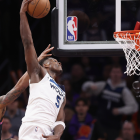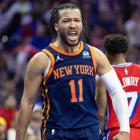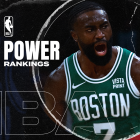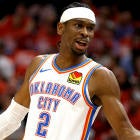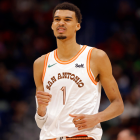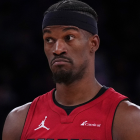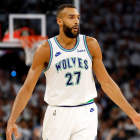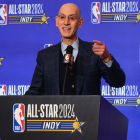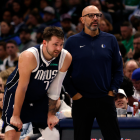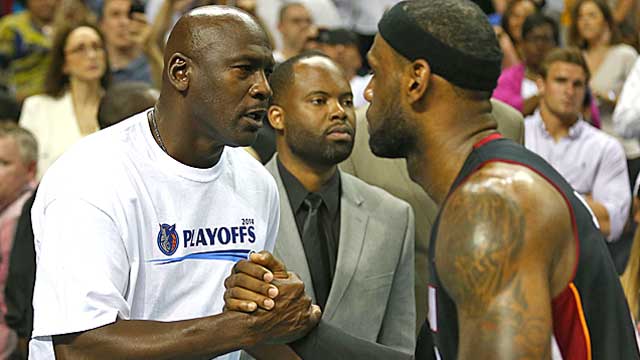
CHARLOTTE, N.C. -- Michael Jordan has been walking the hallways of the arena here, examining every paint scheme for flaws and ordering every locker and closet to be free of clutter.
Trust me, you want him in your house doing this, like yesterday.
He wants more purple-and-teal stripes here, more lighting there. He wants every player employed by his Charlotte Hornets to feel the experience of going to work with a purpose from the minute he climbs out of his SUV and takes his first steps into the building. Organizationally, he wants a team that operates like the San Antonio Spurs (Who doesn’t?). From a player and fan perspective, he wants a distinct game-night experience like the one he had in Chicago.
Thirty years after his rookie season with the Bulls, Jordan is in a much different place than ever in his basketball life. As Charlotte officially welcomes back the Hornets on Wednesday night in a top-to-bottom rebranding and reconnection with a proud past, something else that's critical to the big picture is happening.
The rebranding of Michael Jordan, the owner.
"It all starts with me," Jordan said Wednesday to a group of reporters touring the Hornets' rebranded arena hours before opening night against the Milwaukee Bucks. "The criticism starts with me. And if things go well, everybody always looks a bunch of different ways. But if things go bad, they always look to the top. And I understand that, which makes me get more involved."
Entering his fourth full season as majority owner, Jordan is much more hands-on and visible than ever before. He made plenty of mistakes -- in Washington and in Charlotte under previous ownership -- and learned from them, he said. For better or worse, he finally seems comfortable and in control.
"I can put my own DNA, I can put my own twists, I can put my own demands and start from a different leadership position," Jordan said. "And those previous situations helped me set those type of standards for that type of leadership and obviously my participation in all of that. And I think that I'm better because of that."
Want to be cynical and say Jordan, 51, is now at the forefront only because the franchise he took over as majority owner in 2010 is finally enjoying some success? Go ahead; that's fair. Reclusive in the past, Jordan went so far as to take over the Hornets' Twitter feed on Tuesday, talking trash with pro golfer Keegan Bradley and even taking a selfie with Hugo, the Hornets' mascot.
"It was a one-day event," Jordan said. "I've never been one of the guys who gets fascinated to let everyone know what I'm doing every minute of the day. I'm not fascinated by that. ... I can't fathom if I was playing in this day and era, all the things I would have to do to keep up, just to maintain, as opposed to just playing the game of basketball."
The game has changed. So has Jordan, and so has the league.
"If there’s a more competitive person in the world, I haven’t met him," former commissioner David Stern said Wednesday night. "And I think that his competitive juices are now flowing on the ownership level. ... Everything that I’ve seen is that Michael has warmed over the last couple of years greatly to the task."
One of the darkest marks on Stern’s 30-year tenure -- the Hornets moving from Charlotte to New Orleans in 2002 -- comes full circle Wednesday night. The team name is back, and with it, so is the history. The arena has undergone a full makeover, right down to the distinctive honeycomb pattern on the court and the "Buzz City" emblems everywhere.
Basically, Charlotte gets a do-over. In many ways, so does Jordan.
But whereas Jordan the player helped save the NBA from its own uncertain future in the mid-1980s, Jordan the owner has been buoyed by this confluence of events that includes, above all, a winning basketball team. The Hornets were taking the floor against the Bucks coming off a 43-win season and their second playoff appearance since the franchise returned as the expansion Bobcats in 2004.
"Am I a more experienced owner? Yes," Jordan said. "Am I an owner that made mistakes? Yes. Am I an owner that made good decisions? I like to assume that I did. But it's amazing what winning does. … Based on the wins and losses over the years I've been in ownership, people have questioned that. Now that we're winning, people are giving their opinions about that from a different perspective."
When Charlotte was awarded an expansion team to replace the departed Hornets in 2004, the NBA was back -- "but not the beloved NBA," said Hornets president Fred Whitfield, a longtime member of Jordan's inner circle. "A lot of Hornets fans were against the NBA brand because something they loved very, very dearly had been unfairly taken away from them."
It was the rebuilding job of all rebuilding jobs, and the franchise finally is getting some traction.
After two failed coaching hires -- Paul Silas, who won seven games in 2011-12 and Mike Dunlap, who won 21 in 2012-13 -- Jordan finally got it right with Steve Clifford, who took over the worst defensive team in the league and vaulted it into the top five last season. With Al Jefferson last summer and Lance Stephenson this year, Jordan is having some level of success attracting free agents. Kemba Walker, the ninth pick in the 2011 draft, is a point guard you can build around.
"Big Al took a gamble on us," Jordan said. "We took a gamble on him as well. I think it opened up the doors where we could always strengthen our team in free agency as well as through the draft; maybe not as much in the draft, because you don't want to always be in that lottery. It gives a team flexibility to choose your own direction."
To an extent. After winning six championships in Chicago, Jordan now understands how the other half lives and the economic restrictions placed on small-market owners. Even after the massive shift in the NBA landscape that came out of the 2011 lockout, Jordan still doesn't see commissioner Adam Silver's vision coming true: that every team, if well managed, will have a chance to compete for a championship and make a profit regardless of market size.
Silver, evidently, doesn't see that goal as a reality yet, either. Last week after the Board of Governors meeting in New York, the commissioner revealed that one-third of the NBA's 30 teams are still losing money. Even with a team that was second only to the Cavaliers in new season-ticket sales this summer, with 30 new corporate partners and a 77 percent increase in team store sales, Jordan said competitive balance still has not been achieved among large, mid-sized and small markets.
"I don't know if we'll ever get to that point," Jordan said. "But I think the thing from my challenge is, look, we've got to manage this thing in a way that's going to best suit this market, this community and this fan base. Will I ever be in the same category as the Lakers or the big-market teams? No. … We've come to grips in terms of where we are in the market that we’re in. Now, we're just trying to maximize every opportunity."
In a rare extensive interview, Jordan touched on other topics, including:
• His failure during his first management go-round with the Wizards: "It was the first time I've ever been into the operations standpoint. I had different leadership, different perspectives, different initiatives, different roles, expectations from an organization standpoint, [over] which I had no control. … A lot of things happened -- me going back to play, and in doing so we didn't understand some of the dynamics of being a general manager in terms of selecting personnel, finding the right mix, finding the camaraderie, the continuity from a basketball sense. So that was a learning curve for me."
• The 30th anniversary of his NBA debut: "I haven’t thought about that. I've been too far removed to think about it. Granted, those are memories that every time you guys ask me that, you bring back those memories. But I'm in a different place right now. I'm happy where I am. Do I ever have thoughts of wishing I could still play the game? Yeah; I mean, that's human nature. But those are short thoughts until I pick up a ball or my knees start to hurt. I'm good. I'm right where I need to be. I'm very happy to be who I am."
• Something better and worse about the NBA now and then: "Obviously, the business of basketball is much, much better from a financial standpoint -- from an ownership as well as from a players' standpoint. What's worse? I don't play the game now; there's a lot of things I'm pretty sure I could point to. The talent; it's really tough to select who's going to be that player. Each and every year, it’s almost a gamble. No matter how much you try to define or you invest in scouting and things of that nature, it's never really a given that the talent that you selected is going to be that talent that you expect [will] lead you to that next level. I think it was a little easier back in the day, back when we played, when kids were in school three or four years and the coaching was a little bit better. That's a big change."
• Involving Nike and Jordan Brand in the rebranding of the Hornets: "With Jordan Brand, we like to create from a blank wall. We couldn't quite do that here with the Hornets because of the history that they had, the look, the color scheme and everything like that. But our team is very excited with how we put our spin on it. Make it fresh, but still please the history of what the Hornets represented back in the day."
• Whether he's surprised it took him this long to find success as an owner and executive: "I think it's harder than most people think. I've been an owner for four years. And some people have been in this business a lot longer and still haven't put together a sustainable, successful scenario. So it's not as easy as it seems. You look at teams like San Antonio and places like that. Even there, it took years to get to that level where they were good enough to sustain it. I'm not really worried about how I got here. I want to maintain it and be consistent about it. Because I've seen the other side of it and that's not fun."
• Whether it's awkward for him, as a former player, to sit on the opposite side of the table in owner-player negotiations: "I'm always going to try and understand the economics of the business, and that's going to change through the collective bargaining agreement and all other facets. It's important for all players, all business owners, to understand how your business may change over a period of time. You have to strategize towards it; with it or against it. I'm in a unique position. I've been on both sides and understood, from a player's standpoint [and] now from an owner's standpoint. Now, [I'm] seeing how the dynamics may change down the road to strategize within my team, my organization, and prepare for that. That's an education I don't know that you can get from most colleges."
• Whether it's fair to criticize Kobe Bryant for taking max money at age 36: "I can't speak in terms how Kobe feels about the scenario. Can I criticize him for maximizing his opportunity from a financial standpoint? No. Does his decision affect how the team structures certain things? Maybe. But that's something the team didn't have to give him. They could've easily said no. They could've given a different scenario with Kobe and he can make a choice from that standpoint. It's easy to criticize from where we sit, and you don't know all the dynamics and why and what the opportunities were for him. I'm not going to criticize him for taking advantage of the opportunity presented to him from a financial standpoint."
• His expectations for the team: "I would like to be better than we were last year. We built ourselves a base of 43 wins. I'd like to see us improve on that. I'd like to see us go deep into the playoffs. I don't want the guys to get complacent from what we did last year. … I am a player that was on both sides of success. When I first got to Chicago, we were not a great team. We worked our way to the top. Once we got to the top, we didn’t want to lose. We didn’t want to go back the other way. I want that feeling with this team. They made a statement last year. They've been to the bottom. Let's work our way to the top and get that feeling."
>> Want more NBA opening week? Every team's projected record













